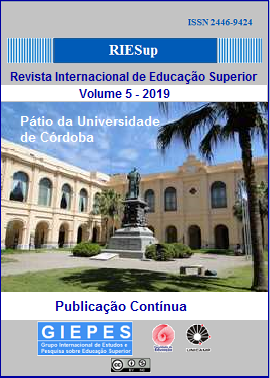Abstract
In 2007, through Decree No. 6,096, the Program to Support the Restructuring and Expansion Plans of the Brazilian Federal Universities, known as REUNI, was instituted in Brazil. Its main objectives were to expand the higher education enrolments, raise the conclusion rates and reduce dropouts rates.Shortly before REUNI, the Universidade Federal deSão Paulo (UNIFESP) had already started an expansion process and later joined the program, further expanding the number of courses, campusesandenrolments. Parallel to the undergraduate coursesthat traditionally offered, the university implemented newonesand with different academic training models, amongthem, the so-called Interdisciplinary Bachelor degree(BI). In view of this scenario, the article analyses the different UNIFESPacademic training models in order to understand the extent to which they favor the rates of permanence and conclusion amongtheir students. In order to do so, data related to enrollment, academic performance, dropoutrate and academic success rate were analysed consideringthe differentacademictraining models. The analysis showsthat alternative models alone do not extend permanence and conclusion rates among the studentsand do not improve student academic achievement, not even inBIacademic training model. Finally, it is emphasizedthe importance of knowing better the new students profile and their basic needs.
References
BRASIL. Constituição da República Federativa do Brasil. Brasília: Supremo Tribunal Federal, Secretaria de Documentação, 2018. 518 p. Atualizada até a EC n. 99/2017. ISBN: 978-85-61435-84-4. Disponível em: http://www.stf.jus.br/arquivo/cms/legislacaoConstituicao/anexo/CF.pdf. Acesso em: 3 mar. 2018
BRASIL. MEC. Decreto nº 6.096, de 24 de abril de 2007. Institui o Programa de Apoio a Planos de Reestruturação e Expansão das Universidades Federais: REUNI. Disponível em: http://www.planalto.gov.br/ccivil_03/_ato2007-2010/2007/decreto/d6096.htm. Acesso em: 08 fev. 2018
BRASIL. MEC. Decreto nº 7.234, de 19 de julho de 2010. Dispõe sobre o Programa Nacional de Assistência Estudantil – PNAES. Disponível em: http://www.planalto.gov.br/ccivil_03/_ato2007-2010/2010/decreto/d7234.htm. Acesso em: 2 fev.2018
BRASIL. MEC. Referenciais orientadores para os bacharelados interdisciplinares e similares. Brasília: 2010. Disponível em: http://reuni.mec.gov.br. Acesso em: 14 nov. 2017
LEÃO, Gabriel Mathias Carneiro; TEIXEIRA, Rosane de Fátima Batista. Itinerários formativos: caminhos possíveis na
educação profissional. XII CONGRESSO NACIONAL DE EDUCAÇÃO. EDUCERE, III SEMINÁRIO INTERNACIONAL DE REPRESENTAÇÕES SOCIAIS, SUBJETIVIDADE E EDUCAÇÃO. SIRSSE E VI SEMINÁRIO INTERNACIONAL SOBRE PROFISSIONALIZAÇÃO DOCENTE. SIPD/CÁTEDRA UNESCO. Anais do XII Congresso Nacional de Educação. Educere, III Seminário Internacional de Representações Sociais, Subjetividade e Educação. SIRSSE e VI Seminário Internacional sobre Profissionalização Docente. SIPD/CÁTEDRA UNESCO. Curitiba: Congresso Nacional de Educação, 2015, p. 6842-6850.
LÉDA, Denise; MANCEBO, Deise. REUNI: heteronomia e precarização da universidade e do trabalho docente. Educação e Realidade, Santa Catarina, n. 34, p. 49-64, 2009. Disponível em: http://seer.ufrgs.br/index.php/educacaoerealidade/article/view/8457. Acesso em: 3 jun 2018
LIMA, Licínio; AZEVEDO, Mário Luiz Neves de; CATANI, Afrânio Mendes. O processo de Bolonha, a avaliação da educação superior e algumas considerações sobre a Universidade Nova. Avaliação (Campinas), Sorocaba, v. 13, n. 1, p. 07-36, 2008. Disponível em: http://www.scielo.br/scielo.php?pid=S1414-40772008000100002&script=sci_abstract&tlng=pt. Acesso em: 3 jun 2018
PACHANE, Graziela Giusti; VITORINO, Bruna de Melo. A expansão do ensino superior no Brasil pelo Programa REUNI: democratização da formação universitária ou apenas uma ambivalência legal? Poiésis, Tubarão. v.9, n.16, p.438-456, 2015. Disponível em: http://www.portaldeperiodicos.unisul.br/index.php/Poiesis/article/view/3114. Acesso em: 3 jun 2018
SILVA, Josielle Soares da; CASTRO, Alda Maria Duarte Araújo. Políticas de expansão para o ensino superior no contexto do REUNI: a implementação do programa na UFRN. HOLOS, Rio Grande do Norte, Ano 30, Vol. 6, p.207-224, 2014. Disponível em: http://www2.ifrn.edu.br/ojs/index.php/HOLOS/article/view/2152. Acesso em: 3 jun 2018
A Revista Internacional de Educação Superior utiliza a licença do Creative Commons (CC), preservando assim, a integridade dos artigos em ambiente de acesso aberto.


